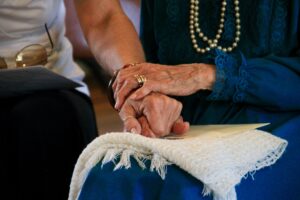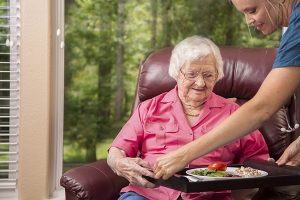
“Can you die from dementia?” is a common question and concern among adult children with aging parents in Wisconsin and other parts of the US.
Other questions surrounding elderly adults with dementia include:
- Can dementia kill you?
- How do you die from dementia?
- How does dementia kill you?
- Can you die from Alzheimer’s?
Though seemingly similar, these questions address subtle differences in the complications and nature of dementia’s effects on the body.
If you’re an adult child or family caregiver with a family member suffering from dementia, you may have these questions. You may also wonder what to do for parents or family members with dementia.
In this article, we’re sharing the symptoms and complications of dementia, how dementia affects an individual at the end of life, and how to care for a loved one with dementia.
Keep reading to get answers to your questions about dementia.
What is Dementia?
Dementia is a general term for memory loss and decreased mental function that arises from abnormal brain changes. Often, these changes result in brain cell damage leading to cognitive and physical decline. Unfortunately, there’s still no known cause or cure for dementia.
When people think of dementia, they also usually think of Alzheimer’s. Alzheimer’s is a specific form of dementia that accounts for 60-80% of dementia cases. Other forms of dementia include Lewy Body dementia and vascular dementia.
Many dementia conditions are progressive, meaning that dementia symptoms start slowly and gradually get worse over time. Dementia can also begin to affect an individual’s physical functions like walking, speaking, and chewing. These progressive complications of dementia are what makes it such a challenging condition to handle.
What Are the Signs of Dementia?
Common signs and symptoms of dementia include:
- Problems with short-term memory
- Trouble keeping track of personal items
- Forgetfulness (e.g., names, places, appointments)
- Disorientation in familiar places
Dementia affects each person uniquely, so symptoms start and progress differently from individual to individual. If you suspect that your loved one is showing signs of dementia, it may be best to take them to see a doctor for an initial screening and check-up.
Because dementia heavily affects the brain, people often wonder, “Is dementia fatal?” Below we’ve compiled some of the top questions and answers about dementia’s effect on an individual’s physical health.
Can You Die From Dementia?
The answer to “Can dementia kill you?” is complicated.
Dementia in and of itself rarely causes someone to pass away. It isn’t an acute disease that immediately and heavily affects someone’s life, like a heart attack or stroke. If you have a loved one showing early signs of dementia, you’ll still have time to enjoy them.
Instead, as we mentioned above, dementia can slowly progress over time from mild to severe symptoms. As dementia progresses, it can start to affect different parts of the brain and an individual’s ability to perform daily tasks. In more advanced stages, a person with dementia may be unable to walk or eat independently. Eventually, the individual will pass away either from age or complications as a result of dementia.
But is immediately dying from dementia likely? No, people who start to show signs of dementia can live joyfully for many more years with the proper care and patience from loved ones.
How Do You Die From Dementia?
Even though immediate death from dementia or Alzheimer’s is unlikely, dementia-related diseases often contribute to other factors that can lead to death. Like dementia itself, these factors are usually progressive and develop slowly over time. And though there’s no cure for dementia, there are ways to care for a loved one with these conditions so they can live as long and pain-free as possible.
Alzheimer’s is a specific form of dementia, so “How do you die from dementia?” and “How do you die from Alzheimer’s?” are closely related. Here’s how Dementia (or a form of dementia like Alzheimer’s) can contribute to a loved one passing.
How Does Dementia Cause Death?
We mentioned above that as dementia progresses, it can lead to an individual losing the ability to walk and eat. These two factors can cause a person with dementia to become frail and malnourished.
Frailty can lead to an increased risk of injury or falling as individuals move around independently. Malnutrition can weaken an individual’s immune system and increase the risk of sickness. Contracting an acute illness like pneumonia is often fatal for someone with a weakened immune system.
Often, people with dementia pass away because their body is weak and can’t fight off infection any longer. Pre-existing conditions like heart disease, high blood pressure, or diabetes can also lead to an increased death rate in individuals with dementia.
So, can you die from Alzheimer’s or other dementia-related diseases? Yes, but as we stated earlier, dementia often contributes to death but isn’t usually the main factor.
Managing frailty and malnutrition early on is a helpful way to increase the life expectancy and overall quality of life for a loved one with dementia.
However, it can be challenging to provide full-time care to a parent or family member with dementia. Here are some resources available to you as you navigate caring for a loved one with dementia.
Expert Help Caring for a Parent with Dementia
Dementia is a cognitive disease that often leads to an individual’s inability to live and perform daily tasks independently. When you first realize that a loved one has dementia, questions may come to mind like:
- How do you care for someone with dementia?
- How do you die from dementia?
- Can you die from Alzheimer’s?
- Can dementia kill you?
Stay calm and don’t be overwhelmed. Rarely does dementia lead to immediate death, and there are many things you can do to enjoy your family member and provide care for them.
Stowell Associates is an expert elder care agency with trained Care Coaches and Caregivers who can assist you in caring for your aging parent with dementia.
Care Coaching
Are you an adult child providing care to a loved one with dementia but unsure what to do? If you are, you may realize that caring for your loved one is challenging. There’s a great resource available to learn how to care for a loved one.
Stowell Associate’s Care Coaching service offers virtual access to a trusted master’s level social worker who knows the challenges of caring for an elderly parent. Your Care Coach will work with you in an ongoing one-on-one capacity to guide you through your journey as a family caregiver. Through monthly phone calls, they’ll help you identify and prioritize your concerns and then create an action plan to better your loved one’s quality of life.
Additionally, Care Coaches can aid in disease education. Stowell has decades of experience with dementia and dementia-related diseases. Drawing on this experience, your Care Coach can provide educational resources and support as you navigate new or unfamiliar diagnoses.
Regardless of your U.S. location, you can get remote access to a Care Coach for only $100/month.
Contact us today to start a Care Coaching relationship with one of our friendly and professional Care Coaches. Our Care Coaches take the guesswork out of caring for a loved one by providing you with confidence and peace of mind as you care for family members with dementia.
In-home Advanced Care
At some point, your loved one with dementia may need more care than you can provide. If this happens, our Care Managers and Caregivers in Wisconsin can step in to provide full-time care for your elderly parents.
Care Managers are registered nurses and master’s-level social workers. Their goal is to work with you to identify your loved one’s care needs and create a personalized care plan. Once they complete the plan, our highly-trained Caregivers will step into your family members’ home and put the plan into action. As they age and their conditions progress, we’ll make necessary adjustments to ensure your parents are always receiving the best care possible.
Contact our Care Team to learn more about in-home care and how it can help provide the hands-on care your parents need.












